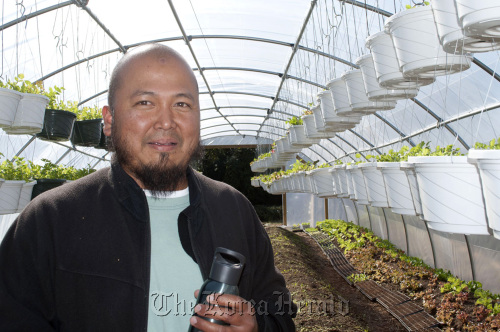EDMONSTON, Maryland ― On most days, Roy Caspari, a native of Indonesia, works as a massage therapist and landlord in College Park, Maryland. But every Saturday, Caspari drives to Edmonston, Maryland, to learn about urban farming with new friends from Guatemala, Peru, Ethiopia and Honduras.
“Everybody (is) from different places, from different countries,” said Caspari. “But because we are here for one thing ... we just click.”
Caspari is one of eight trainees participating in a fledging program designed to train immigrants and others living in urban areas to farm so that they can provide fresh, local food to underserved communities and earn a living wage.
The program, a partnership between the Crossroads Farmer’s Market in Takoma Park, Maryland, and the Edmonston Urban Farm, provides 10 months of training, in everything from composting to growing sprouts to farm management. At the end of the program, the majority of the trainees will receive a $2,700 stipend to start their own farms.
 |
Roy Caspari takes a break during his Saturday training at the Edmonston, Maryland Urban Farm. Caspari is one of eight participants in the urban farmer training program. (Capital News Service/MCT) |
“I’m trying to create and help find a way to have farming be profitable, not marginal,” said Margaret Morgan-Hubbard, CEO of the nonprofit Engage Community Offshoots, which operates the Edmonston farm. “That’s part of our experiment here, to figure out how people can have a decent living wage at farming.”
The program launched last summer with a $30,000 grant that Crossroads received from Project for Public Spaces, a nonprofit planning, design and educational organization. Trainees were recruited through outreach events at Casa de Maryland, an immigrant employment service, and at neighborhoods in Edmonston and Takoma Park.
Michelle Dudley, co-director of Crossroads, said she had met individuals coming to Crossroads who had agricultural experience in their home countries but didn’t know how to get started in farming in Maryland.
“That’s not something you can explain to someone in one conversation, especially the land issue, and loans and the growing season,” she said.
The grant was initially provided in 2007 to start a micro-loan program for immigrant and refugee farmers, but Dudley felt important pieces were missing: training and access to land.
“Even if these people had a couple thousand dollars from the micro-loan program to start up a farm, it would not have been feasible” to do so without training, she said.
So instead of distributing the funds at the time, Dudley proposed in January a partnership with ECO to use the funds for an urban farmer’s training program.
Her proposal was accepted, and recruitment began in April.
For ECO, this was a way to create better options for the immigrant-heavy neighborhoods surrounding the Edmonston farm. If you want to get healthy food into an El Salvadoran community, “train and get El Salvadorans to grow healthy food,” said Vinnie Bevinino, ECO director of urban agriculture operations.
Many of the program’s participants, including Caspari, have already brought their family and neighbors out to the farm to show them what they are doing.
Some of the techniques Caspari has learned were used by his grandparents in Indonesia, he said. But they didn’t know it was organic farming.
“Now I teach this to my kids,” he said.
Participants in the program, who also learned marketing strategies beginning in August, took turns selling at the Crossroads Farmer’s Market every Wednesday up until last month, when the market closed for the winter.
Jose Castillo, a program participant, said he sold all 20 gallons of honey he brought on his first four trips to the Crossroads Farmer’s Market. Castillo, who is originally from Guatemala, keeps bees in his backyard.
“I find out that honey is a type of sentimental food,” he said. “Because when people try my honey... they say, ‘Wow, this is the honey like from my home country ... the honey like my grandfather’s.’”
And when they taste it, they buy it right away, he said. “People from Latin America, from China, from the states, from Slovakia, all Europe ... My honey is good stuff ... very ripe, raw, local.”
By Tami Le
(Capital News Service)
(McClatchy-Tribune Information Services)


![[Herald Interview] 'Korea, don't repeat Hong Kong's mistakes on foreign caregivers'](http://res.heraldm.com/phpwas/restmb_idxmake.php?idx=644&simg=/content/image/2024/11/13/20241113050481_0.jpg)
![[KH Explains] Why Yoon golfing is so controversial](http://res.heraldm.com/phpwas/restmb_idxmake.php?idx=644&simg=/content/image/2024/11/13/20241113050608_0.jpg)




